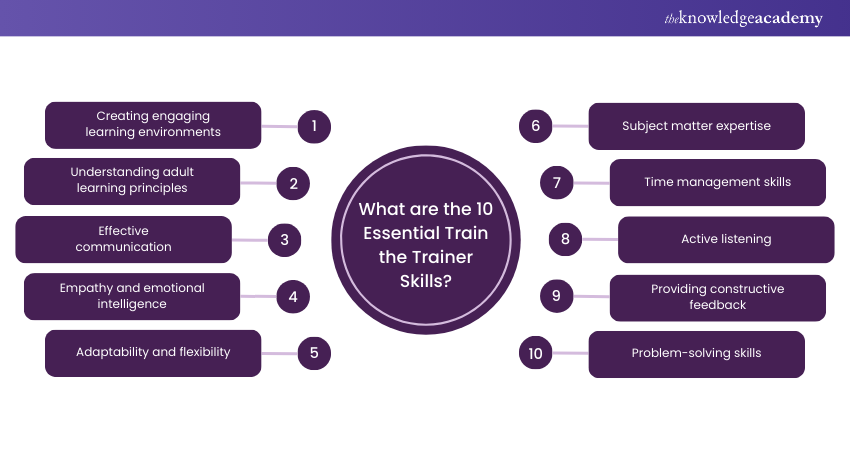We may not have the course you’re looking for. If you enquire or give us a call on + 1-866 272 8822 and speak to our training experts, we may still be able to help with your training requirements.
Training Outcomes Within Your Budget!
We ensure quality, budget-alignment, and timely delivery by our expert instructors.

As trainers strive to excel in their roles, continuous development of Train the Trainer Skills is paramount. These skills are pivotal in empowering educators to create transformative learning experiences. Additionally, understanding the Train the Trainer Advantages and Disadvantages can further enhance their effectiveness in facilitating meaningful training sessions.
So, if you are new to the field of training or wish to explore the significance of trainer skills and their potential, this blog is just for you. Read this blog to learn about Train the Trainer Skills that any trainer must develop to revolutionise the world of education and professional development.
Table of Contents
1) The importance of training for Trainers
2) 10 Essential Train the Trainer Skills
a) Creating engaging learning environments
b) Understanding adult learning principles
c) Effective communication
d) Empathy and emotional intelligence
e) Adaptability and flexibility
f) Subject matter expertise
g) Time management skills
h) Active listening
i) Providing constructive feedback
j) Problem-solving skills
3) Conclusion
The importance of training for Trainers
To enhance the effectiveness of these processes, incorporating Best Practices for Train the Trainer becomes essential, ensuring that the trainers are equipped with the latest methodologies. and tools to meet evolving learner needs. Moreover, subject matter expertise builds credibility, and fosters trust among learners, enhancing training effectiveness.
A Personal Development Coach guides a Trainer's self-reflection and continuous improvement to refine their craft and teaching approach. Embracing innovative techniques and active learning strategies creates dynamic learning experiences.
Training also cultivates professional growth and a passion for lifelong learning. It inspires learners to value their educational journeys. Additionally, recognizing training's significance, including in fields like Life Coaching, empowers Trainers to become skilled and effective educators, benefiting both themselves and their learners.

What are the 10 Essential Train the Trainer Skills?
Now, let's delve into the 10 crucial Train the Trainer Skills that can empower you to be a successful Trainer:

1) Creating engaging learning environments
Engagement holds the key to unlocking effective learning experiences. A successful Trainer understands the importance of creating an environment that captivates learners' attention and fosters enthusiasm for learning.
To achieve this, Trainers can employ a diverse range of strategies, such as interactive activities, thought-provoking group discussions, and the integration of multimedia tools.
Encouraging active participation from learners allows them to contribute their perspectives and experiences. It transforms the learning process into a dynamic and enriching journey for everyone involved.
By nurturing an engaging learning environment, Trainers pave the way for enhanced knowledge retention and a deeper connection between learners and the subject matter.
2) Understanding adult learning principles
Adult learners possess unique characteristics and needs that differ from younger students. Acknowledging these distinctions and integrating adult learning principles into training methods becomes essential for achieving success as a trainer. By doing so, Trainers can ensure that the content presented is not only relevant but also meaningful and applicable to the learners' professional and personal lives.
An understanding of how adults learn best empowers Trainers to tailor their approach. This results in more effective and valuable training sessions for all participants. By catering to the specific requirements of adult learners, Trainers foster a conducive learning environment that encourages active engagement and practical application of knowledge.
3) Effective communication
Communication lies at the core of successful training. As a Trainer, developing proficient verbal and non-verbal Communication skills is crucial to convey ideas clearly and facilitate effective learning.
Particularly, maintaining eye contact with learners creates a sense of connection and attentiveness. Skilful use of gestures and varying tones keeps learners engaged and interested in the subject matter.
Moreover, effective communication fosters a positive and receptive learning environment where learners feel comfortable asking questions and actively participating in discussions. By mastering the art of communication, Trainers can elevate the impact of their training sessions and create an enriching experience for all learners involved.
4) Empathy and emotional intelligence
Empathy serves as a bridge, connecting Trainers with their learners on a deeper level. By understanding the challenges and emotions that learners may experience, Trainers can create a safe and supportive space for the learning journey. Demonstrating empathy fosters trust and encourages open communication, enabling learners to feel heard and valued.
Emotional Intelligence is vital in managing group dynamics during training sessions. Trainers with high emotional intelligence can navigate interpersonal relationships effectively, resolve conflicts, and maintain a positive atmosphere. This skill empowers Trainers to address individual needs sensitively and adapt their approach to suit diverse learning styles. This ultimately enhances the overall learning experience for everyone involved.
Learn to coach individuals efficiently with our Coaching Skills Course today!
5) Adaptability and flexibility
In the realm of training, every session presents its own distinct challenges and opportunities. As a Trainer, embracing adaptability and flexibility is key to successfully navigating these diverse situations. Adaptability allows Trainers to respond effectively to unexpected circumstances, ensuring the learning process remains uninterrupted.
Flexibility empowers Trainers to tailor their approach to suit the varied learning styles and preferences of their audience. By embracing diverse teaching methods and adjusting their strategies as needed, Trainers can create a dynamic and inclusive learning environment. As a result, they can cater to the individual needs of each participant.
Additionally, emphasising adaptability and flexibility builds a more versatile and resilient Trainer capable of delivering impactful and personalised learning experiences.
6) Subject matter expertise
As a Trainer, a comprehensive understanding of the subject matter is a fundamental requirement. A thorough grasp of the content being taught not only instils confidence in learners but also enhances the credibility of the Trainer. By being well-versed in the subject, Trainers can provide in-depth insights and practical examples that resonate with their audience.
Moreover, the pursuit of continuous learning is essential for maintaining subject matter expertise. Trainers must stay abreast of industry trends, new research, and evolving best practices to offer up-to-date and relevant information to their learners.
Demonstrating a commitment to ongoing education not only enriches the Trainer's knowledge but also inspires learners to value the importance of lifelong learning.
7) Time management skills
Time management is a crucial aspect of successful training. Skilful time management enables Trainers to make the most of their allotted time. This ensures that all essential topics are covered thoroughly. By efficiently planning the training session, Trainers can avoid rushing through content and ensure a comprehensive learning experience for their audience.
Creating a well-structured schedule is paramount to effective time management. Trainers should prioritise content based on its significance and relevance, allowing them to focus on key concepts and allocate appropriate time for each topic. By mastering time management skills, Trainers can deliver engaging and organised training sessions that leave a lasting impact on their learners.
Learn the duties of a mentor with our Mentoring Skills Course today!
8) Active listening
Possessing Active Listening Skills elevates the training experience for both Trainers and learners. By listening attentively to learners' questions and concerns, Trainers create a supportive and engaging learning environment. Similarly, when learners feel heard and acknowledged, they become more invested in the learning process, leading to enhanced knowledge retention.
Demonstrating genuine interest in what learners have to say is key to active listening. Trainers should focus on understanding the perspectives and needs of their audience. They should foster a sense of trust and respect.
Moreover, thoughtful responses to learners' queries demonstrate that their contributions are valued, encouraging further participation and facilitating meaningful discussions. Active listening also transforms training sessions into collaborative and interactive experiences. As a result, it promotes a deeper understanding and appreciation of the subject matter.
9) Providing constructive feedback
Feedback serves as a powerful catalyst for improvement in the training process. As a Trainer, offering constructive feedback is essential to empower learners on their development journey. Recognising learners' strengths and achievements boosts their confidence and encourages continued growth.
Constructive feedback should be delivered in a supportive and encouraging manner. It should focus on areas for improvement without undermining learners' efforts. By identifying specific strengths and suggesting actionable steps for growth, Trainers help learners refine their skills and reach their full potential.
Moreover, celebrating learners' accomplishments fosters a positive learning environment and motivates them to persevere in their learning endeavours. Providing constructive feedback that inspires and nurtures growth creates a culture of continuous improvement. This results in more engaged and successful learners.
10) Problem-solving skills
In the realm of training, not every session unfolds flawlessly. Trainers equipped with Problem-Solving Skills can navigate through challenges and maintain the training on track. Developing the ability to address unexpected issues with creativity and resourcefulness ensures a seamless learning experience.
Moreover, staying calm and composed in the face of challenges is paramount. Trainers who maintain their composure can think rationally and make informed decisions. This helps minimise disruptions to the training process.
By proactively resolving obstacles, Trainers demonstrate their adaptability and commitment to the learners' success. They can foster a positive and productive learning environment. Problem-solving skills empower Trainers to overcome hurdles effectively, ensuring that every training session remains engaging and impactful.
Conclusion
In conclusion, the seamless integration of continuous training, the constant refinement of subject matter expertise, and the cultivation of a culture of perpetual self-improvement are the keystones to unlocking the full potential of Trainers in their roles. As they diligently sharpen their Train the Trainer Skills, these educators craft transformative learning experiences that not only inspire but also significantly enhance the educational journey for all participants. This commitment to excellence is further heightened by recognizing the invaluable Benefits of Online Coaching, which acts as a dynamic catalyst, propelling Trainers toward a realm of boundless growth and proficiency.
Ready to enhance your leadership skills? Enroll in our Coaching and Mentoring Training Course today!
Frequently Asked Questions
Upcoming Business Skills Resources Batches & Dates
Date
 Train the Trainer
Train the Trainer
Fri 17th Jan 2025
Fri 21st Feb 2025
Fri 4th Apr 2025
Fri 6th Jun 2025
Fri 29th Aug 2025
Fri 24th Oct 2025
Fri 26th Dec 2025







 Top Rated Course
Top Rated Course


 If you wish to make any changes to your course, please
If you wish to make any changes to your course, please


